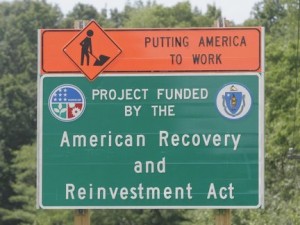 James Heintz ’01G, assistant research professor at the Political Economy Research Institute (PERI) and Robert Pollin, UMass Amherst economics professor and co-director of PERI, commented in a story about the progress of the economic stimulus package. Although you can track the spending through government websites, interpreting the data is “not the easiest thing,” admits Pollin. Heintz points out that one problem stems from the fact that there are many branches of the state and federal governments administering the funds. (Masslive.com, 3/14/2010)
James Heintz ’01G, assistant research professor at the Political Economy Research Institute (PERI) and Robert Pollin, UMass Amherst economics professor and co-director of PERI, commented in a story about the progress of the economic stimulus package. Although you can track the spending through government websites, interpreting the data is “not the easiest thing,” admits Pollin. Heintz points out that one problem stems from the fact that there are many branches of the state and federal governments administering the funds. (Masslive.com, 3/14/2010)
Category: Pollin
 In a recent interview on The Real News Network, Robert Pollin, UMass Amherst economics professor and co-director of the Political Economy Research Institute, discuss whether or not higher wages would lead to inflation. He claims that theonly way higher wages would cause inflation is if the wages are rise faster than companies’ ability to produce things. Furthermore, he argues that if prices do increase because workers are making more money, are happy and willing to buy things, this would be a sign of a healthy economy. (The Real News Network, 3/7/2010)
In a recent interview on The Real News Network, Robert Pollin, UMass Amherst economics professor and co-director of the Political Economy Research Institute, discuss whether or not higher wages would lead to inflation. He claims that theonly way higher wages would cause inflation is if the wages are rise faster than companies’ ability to produce things. Furthermore, he argues that if prices do increase because workers are making more money, are happy and willing to buy things, this would be a sign of a healthy economy. (The Real News Network, 3/7/2010)
 An opinion article in The Hill cites the research of Robert Pollin, UMass economics professor and co-director of the Political Economy Research Institute (PERI) and economist Heidi Garrett-Peltier. Their research supports the argument that investments in reforestation would have a bigger impact, both economically and environmentally, on climate change than investments in energy. Specifically, every million dollars of investment in forest, stream restoration and sustainable land management would produce 39 jobs. These investments are cheaper and would generate more jobs than investments in conventional energy sources. And, although most of the attention on climate change is attributed to coal power plants and automobile’s emissions, only half of global greenhouse gases come from energy. Investing in reforestation would generate immediate shovel-ready jobs and significantly cut down on global green house emission. (The Hill, 3/9/10)
An opinion article in The Hill cites the research of Robert Pollin, UMass economics professor and co-director of the Political Economy Research Institute (PERI) and economist Heidi Garrett-Peltier. Their research supports the argument that investments in reforestation would have a bigger impact, both economically and environmentally, on climate change than investments in energy. Specifically, every million dollars of investment in forest, stream restoration and sustainable land management would produce 39 jobs. These investments are cheaper and would generate more jobs than investments in conventional energy sources. And, although most of the attention on climate change is attributed to coal power plants and automobile’s emissions, only half of global greenhouse gases come from energy. Investing in reforestation would generate immediate shovel-ready jobs and significantly cut down on global green house emission. (The Hill, 3/9/10)
 Robert Pollin, UMass economics professor and founding co-director of PERI (Political Economy Research Institute), claims that we can reduce the unemployment rate to 4% by 2012, if we can create 18 million jobs. He says that even though 18 million jobs sounds overwhelming, it’s not unrealistic. In fact, 4% unemployment is similar to the rate we had coming out of the recession in 1975 with President Gerald Ford and in 1977-78 with President Carter. One way of reaching this goal, claims Pollin, is by “firming up the economy’s floor” and then “building and injecting roughly $700 billion in new private credit into productive job creating investments.”
Robert Pollin, UMass economics professor and founding co-director of PERI (Political Economy Research Institute), claims that we can reduce the unemployment rate to 4% by 2012, if we can create 18 million jobs. He says that even though 18 million jobs sounds overwhelming, it’s not unrealistic. In fact, 4% unemployment is similar to the rate we had coming out of the recession in 1975 with President Gerald Ford and in 1977-78 with President Carter. One way of reaching this goal, claims Pollin, is by “firming up the economy’s floor” and then “building and injecting roughly $700 billion in new private credit into productive job creating investments.”
18 Million Jobs by 2012
by Robert Pollin
February 18, 2010The job-creation proposals coming from the Obama administration, in the president’s January 27 State of the Union address and elsewhere, generally point in the right direction, with more spending for clean energy, infrastructure and support for small businesses. These proposals follow from Obama’s February 2009 economic recovery program, which injected $787 billion in new spending or tax relief into the economy over two years. However, just as last February’s stimulus program was too small to counteract the evaporation of $16 trillion in household wealth resulting from the financial collapse, the scope of Obama’s current proposals is nowhere near large enough for the situation today.
For example, Obama has proposed $33 billion in new tax credits for small businesses. By contrast, private borrowing by businesses over the previous six months was down by $1.5 trillion relative to 2007, with the largest proportional cutbacks coming from small businesses. What’s more, Obama’s call to freeze discretionary federal spending in nonmilitary areas is dangerously misguided. The fiscal deficits of 2009 and 2010–at between $1.4 trillion and $1.6 trillion, or around 10 percent of GDP–are indeed very large. But the freeze obscures what Obama and his advisers clearly know–that deficit spending is part of the solution to our economic predicament and will remain so until we see millions of people getting hired into decent jobs.
To read the article in full, click here.

Robert Pollin, UMass Amherst economics professor and co-director of the Political Economy Research Institute (PERI), says jobs in education and research have much lower start-up costs than those in fields such as construction. His comments come as part of the debate over whether the $15 billion federal jobs bill moving through Congress will create enough jobs to offset adding to the national debt. (USA Today, 2/25/10)

Robert Pollin, UMass economics professor and co-director of the Political Economy Research Institute (PERI), argues that maintaining the moratoria on drilling in the U.S. oil and gas reserves won’t significantly affect the GDP. According to Pollin the most important factor is the price of oil. If the price of oil goes up, the GDP will be influenced by how effective we are at energy conservation. “The more we invest now in energy efficiency and building retrofits and public transportation, that is going to reduce the impact of any kind of a price shock on GDP,” states Pollin.
(Daily Climate News and Analysis, 2/18/2010)

Robert Pollin, UMass Amherst economics professor and co-director of the Political Economy Research Institute (PERI), discusses the prospects for national economic recovery and what that could mean for the federal budget deficit. (The Real News Network, 2/6/10)

Robert Pollin, economics professor and co-director of the Political Economy Research Institute, talks about why he believes there should be a federal tax levied on speculative financial transactions. He says such a tax would help prevent speculative bubbles in the economy.
January 6, 2010
The Real News Network
Tax the speculators and create a public bank
 UMass Econ Professor Robert N. Pollin says a 0.5 percent federal tax would raise large amounts of revenue and would discourage the kinds of speculative excesses that have created the current economic crisis. (Bnet.com, 12/21/09)
UMass Econ Professor Robert N. Pollin says a 0.5 percent federal tax would raise large amounts of revenue and would discourage the kinds of speculative excesses that have created the current economic crisis. (Bnet.com, 12/21/09)
In a three-part series entitled “Energy Efficiency Now, Paul Jay, senior editor of theREALnews Network interviewed UMass Economics Professor Robert Pollin about prospects for green transformation of the U.S. and World economies.
A highlight from the first interview:
The main thing that needs to be done right now is to make these short-term investments in energy efficiency, massive ones, such as building retrofits, such as public transportation, making the electrical grid more efficient. So those things need to be done immediately and can be. And then, on top of that, we have to make renewable energy cost competitive with fossil fuels, with oil, coal, and natural gas. And if there is a big enough investment market for that, I think that we can be successful, say, within a decade.
In the second interview, Pollin argues that domestic investments in green energy will create more jobs then foreign investments on oil and other fossil fuels.
Green growth. Okay. So let’s start with the simplest basic numerical exercise, which is if we compare spending money on fossil fuels in the US economy today versus a combination of clean-energy investments today, to spend $1 million you will generate about five jobs per million dollars of spending in fossil fuels, and you’ll generate about 17 jobs per million dollars of spending in the clean-energy economy.
Why? Two basic factors that actually also have nothing particularly to do with whether it’s green or not. The first factor is what we economists call labor intensity, which means, when you spend money on a project, how much goes to hiring people versus buying machines, versus spending on buildings, and versus transportation, long-distance transportation. So if we compare, say, retrofitting a building, making a building more energy-efficient, versus importing oil from Saudi Arabia, we can see in our heads that the number of people that are going to show up at the building is a lot more than the people that are going to get jobs in the US from buying the oil from Saudi Arabia. So that’s the biggest driver. And the second and related one is domestic versus import spending. So if we concentrate a given million dollars of spending and a higher proportion is spent within the US economy, that also will create more jobs. So it’s those two factors. It’s relative labor intensity versus other purchases, and domestic spending versus foreign spending. And those are the factors.
In the third segment, Pollin argues that developing countries won’t necessarily slow down their growth by investing in the green economy.
Video and transcript available at theREALnews.